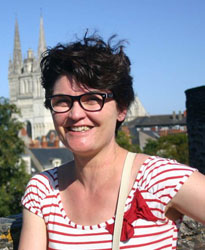Our Team
The site Senior Citizens & Senses is piloted by researchers at the Centre des Sciences du Goût et de l'alimentation and at Dijon CHU, with the support of public and private partners of the Aupalesens, Renessens and Alimassens projects. The aim of the site Senior citizens & Senses is to provide quality information on malnutrition in elderly people and to report the latest advances in research on this theme.
The pupose of our projects. Since 2010, the French government has funded 3 research programmes through calls for projects issued by the 'Agence Nationale de la Recherche. The aim of these projects is to bring together expertise in nutrition and sensory perception so as to of develop innovative solutions to prevent and fight against malnutrition in the elderly. Our ambition: enable all our senior citizens to have a diet that meets their nutritional needs, while taking into account their abilities and their preferences. Our motto: eat with pleasure to enjoy the pleasure of aging well.
Portrait Gallery.

Miriam Clegg, Researcher, University of Reading
Visiting my grandparents house as child was always a delight. It was filled with home-baked fresh scones, fruit cakes and fruit desserts with loads of custard. As my grandmother got older her desire to bake reduced and after my grandad passed away it became clear she wasn't cooking for herself properly at all and the enjoyment of preparing and eating foods was gone.
My own parents are not at that stage, but I see different challenges for them. They try to consume healthy products with low or no fat and remove meat/eggs from their diet. It makes sense, as they have spent much of their middle age being told about the consequences of too much cholesterol. Protein is not something they know much about and trying to get them to eat more of these foods is contrary to their beliefs about what constitutes a healthy diet.

Mathilde Descamps, Doctoral student AlimaSSenS
Last autumn when I went to visit my grandmother, we made a pumpkin purée together. She had never eaten this before and thought it was delicious, but she refused to make it herself without me, because, she said, "I'll never manage to make one as good as yours". Since then, when I go to see her and whatever the time of year, she asks me to buy a pumpkin to make her some of my famous purée!
When elderly people find themselves alone, they don't feel like preparing tasty dishes. Proposing foods that correspond to their desires can help them maintain the pleasure of eating, and if they can share these meals with their nearest and dearest, all the better!

Gilles Feron, Researcher INRAE
Last summer, I invited my parents to the restaurant. My dad, who is 85 and has a denture, chose with great anticipation roast duck breast with figs. He ate it, but it was so difficult to eat that most of the pleasure was probably lost. Fortunately, the white chocolate mousse with raspberries brought back his smile!
Elderly people find it more and more difficult to chew and swallow certain foods. We have to provide healthy food that is adapted to the difficulties they experience, so that eating will continue to be a shared pleasure for as long as possible.

Clémentine Hugol-Gential, Enseignante-chercheure laboratoire CIMEOS (EA 4177, Université de Bourgogne)
Her name was Marie-Louise and when I was a little girl she lived on the ground floor of our house. She was my great-grandmother, a sweet woman I loved spending time with. Sometimes, she invited me to dinner with her, and I was always very proud to announce to my mother that tonight I was not dining at home. From all of my 5 years of age, I descended a floor with a lot of determination. My great-grandmother was waiting for me in the kitchen with a clear broth that I found delicious because it tasted independence and love. Marie-Louise grew older and she moved to a retirement home. Every week I went to see her, and every week she gave me a ten-franc piece and small individual portions of jam that she stole from breakfast. These little jams that I found delicious no longer had the taste of independence but always that of love. Marie-Louise died more than twenty years ago but remains in me, still alive, the memories of broths and jams, these links more than nourishing, these links of transmission and infinite love.

Isabelle Maître, Teacher-researcher ESA Angers Loire
Dizzy, head spinning, sad… that was my father-in-law’s state of mind at 90 years old when he came to spend a few days with us at Easter. Usually such an energetic man, he found it difficult to simply walk round the garden. To me, he seemed feeble, and when I asked him what he’d been eating recently, he admitted that he hadn’t felt like cooking and just had a bit of stewed fruit in the evening. «Anyway, you don’t need so much when you’re old» he said. Three days later, after an Easter-egg hunt, a victory at scrabble and a roast leg of lamb, he was in good spirits, was sleeping well and had found again his usual enthusiasm.
You have to eat well to stay in good health, but your desire to eat depends on many factors. The management of meals and diet in the elderly requires a global approach to the person as a whole.

Claire Sulmont-Rossé, Researcher INRAE
When my husband's grand-mother reached 100 years old, all of the family gathered around her. When she saw the cake with 100 written on it, her eyes seemed to fill with horror, as if she'd only just realized that she was indeed 100 years old. This moment of panic only lasted an instant, then, with a smile full of mischief, she stuck her finger smack in the middle of the cake, then pulled it out and licked it in front of her family and friends.
Meals must always and above all be a source of pleasure. Promoting a healthy diet must take into account the habits and food preferences of elderly people, who are consumers in their own right.

Øydis Ueland, Researcher at NOFIMA, Norway
My mother-in-law has always enjoyed food and the meals she and her husband prepared and ate together. After my father-in-law died, her dinner meals are no longer a time of pleasure. She doesn’t feel hungry, but she eats small meals because she knows she should. Her best meal of the day is the lunch meal which she takes in company of her newspaper. Nowadays we invite her to stay with us in the weekends, spend a long time eating lavish breakfasts and dinners together, and enjoy small talk.
Eating in a social setting with family or friends is a good way to increase food intake in older adults. They feel that the food tastes better, and they eat more.

Virginie Van Wymelbeke, Researcher CHU
My grand-mother was diabetic, had high cholesterol, hypertension and was overweight. Though she paid attention to her diet most of the time, she could not imagine making her apple tart without the authentic ingredients that she'd known since childhood: «sugar, fresh cream, butter and eggs; that's what gives the taste and it's absolutely delicious!» she used to say.
What we eat often reflects our memories and these help us to build our dietary repertoire. By creating the same taste, people respect their choices and ensure that eating remains a pleasure.
 |
 |
 |